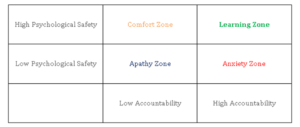In a series of guest blogs, we aim to share with you some valuable insights from local industry professionals. The first? A blog by Rod Willis, of Assentire Ltd, explaining how psychological safety in the workplace can affect your business and your team…
Psychological Safety by Amy Edmondson
Psychological Safety in the workplace: if you don’t have it, people may not speak up just when you really want or need them to!
Why do we all think twice before speaking up?
It’s all too often to do with ‘impression management’. We develop this capability early in life for reasons of psychological self-protection, and by adulthood in our careers we do this, in the main, without even knowing so.
How might this show up?
- Don’t want to look ignorant, so don’t ask questions.
- Don’t want to look incompetent, so don’t admit weaknesses or mistakes.
- Don’t want to look intrusive, so don’t offer ideas.
- Don’t want to look negative, so don’t critique the status quo.
We are so tied up, unconsciously for the most part, in impression management that we just don’t speak up.
Why does this matter?
Every time we withhold something from others, we rob ourselves and our colleagues of small moments of learning. This means we won’t innovate or come up with new ideas.
Are there organizations where people do speak up? Yes! In these organizations, there is a belief that it’s OK to speak up. In fact, it is expected that everyone will speak up when we see concerns, have questions, have ideas or see mistakes. It is fully understood that this is ok behaviour as it helps us create a stronger organization!
Three simple things you can do if you want people to share their thoughts and observations:
- Reframe the work as a learning problem, not an execution problem. Recognize that there is enormous uncertainty and interdependence in today’s work place, so we can’t know what will happen. We need everyone’s voice and brains in the game to do the best that we can.
- Acknowledge fallibility, especially our own, making it clear we don’t have all the answers and we all can miss something important. By doing this, you make it OK to highlight when you don’t know something. By doing so, it also becomes OK for others to highlight when they think you may have missed something.
- Model curiosity, ask a lot of questions, this creates a space where it is OK to explore new and untested ideas.
At this point, some managers start to get a little nervous.
Does this mean we need to dial back on Excellence, is it no longer possible to hold people Accountable?
If we consider Accountability on one axis and Psychological Safety on the other, we can see different types of potential behaviour:

In the Apathy Zone, not so much work gets done and the organisation is at risk from a performance and wellbeing perspective. If in the Comfort zone, almost certainly money is being left on the table and productivity could be enhanced.
Many organizations are in the Anxiety zone. This means people may be stressed, and not feel safe to express themselves. They will not speak up if they see something is going off the rails. The messenger might just get ‘shot’.
The Learning Zone is the most effective. People bring their ‘whole selves’ to work. Free to highlight issues, and free to learn.
You have probably heard of VUCA (Volatility, Uncertainty, Complexity and Ambiguity). To combat this, we need to bring VISION, UNDERSTANDING, CLARITY and AGILITY. If we now link this back to our Accountability and Psychological Safety table, the only item that will deliver this is the LEARNING ZONE.
Do you REALLY have any other choice?
NB: The Anxiety Zone is a dangerous place. It will almost certainly contribute to wellbeing challenges as well as people not speaking up, even if the organisation is about to go over a cliff edge!
This text is abridging a TED talk by Professor Amy Edmondson’s ‘Building a psychologically safe workplace’.
For more information please see: https://getcollaborating.com/
Assentire: Bringing together Thinking and Feeling.
Sign up to our newsletter to stay up to date with all of our news, blogs and events

